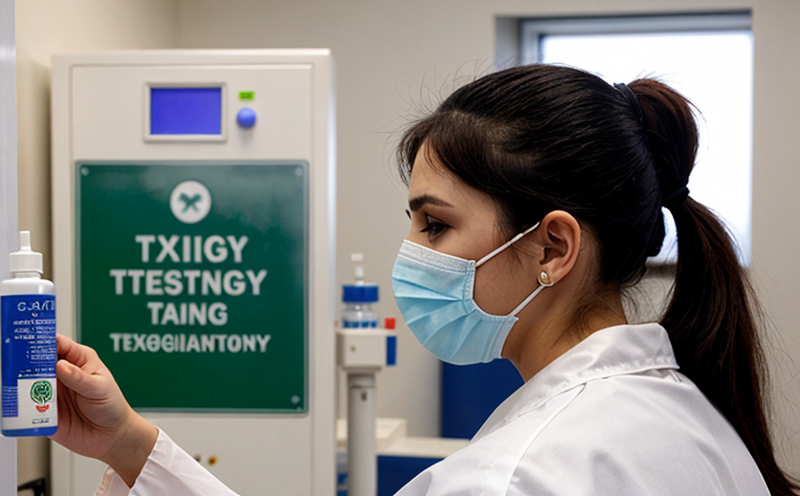Nonclinical Safety Pharmacology Integration Testing
The Nonclinical Safety Pharmacology Integration Testing service is a comprehensive and integrated approach designed to address the critical safety pharmacological aspects of pharmaceutical development. This testing method ensures that potential therapeutic agents are evaluated for their cardiovascular, respiratory, neurological, and other relevant systems' effects before they reach clinical trials.
The primary goal of this service is to identify any adverse drug reactions or interactions early in the drug development process. By leveraging advanced toxicological and safety pharmacology techniques, we provide a robust foundation for regulatory compliance and patient safety. This service aligns with international standards such as ISO 10722-2:2019, which specifies the general principles and practices for nonclinical laboratory studies.
The process begins with in vitro tests using human cells or tissues to assess toxicity at a cellular level. These initial studies help identify potential issues without exposing animals or humans to unnecessary risks. Following this, we proceed with in vivo studies that involve various species to observe the effects of the drug on whole organisms.
Cardiovascular testing is a crucial aspect of our service, focusing on evaluating the impact of the compound on heart rate, blood pressure, and cardiac conduction. Respiratory system assessments include lung function tests to ensure the drug does not induce respiratory distress or other adverse effects. Additionally, neurological evaluations are conducted to assess potential impacts on brain function and behavior.
Our service also encompasses a wide range of specialized testing methods tailored to specific therapeutic areas. For instance, in oncology, we evaluate how the compound interacts with various cancer types while ensuring minimal side effects on healthy tissues. In immunology, we assess the drug's effect on immune responses and potential allergenicity.
Customer Impact and Satisfaction is a key priority for our service. We strive to provide accurate, reliable, and timely results that meet or exceed regulatory requirements. Our services not only help pharmaceutical companies navigate complex regulatory landscapes but also contribute significantly to reducing development costs by identifying safety issues early in the process.
- Customer Impact: Reduced time-to-market for new drugs, increased confidence in product safety, and compliance with international standards.
- Satisfaction: Positive feedback from clients regarding the quality of our services and timely delivery of comprehensive reports.
Benefits
The benefits of Nonclinical Safety Pharmacology Integration Testing are manifold, providing significant advantages to pharmaceutical companies and regulatory bodies alike. By integrating various safety pharmacological tests into a single testing protocol, we ensure that all critical aspects of drug safety are comprehensively evaluated.
This approach enhances the overall quality and reliability of preclinical data, which is crucial for successful drug approvals. It also helps in reducing the attrition rate during clinical trials by identifying potential risks early on. This not only saves time but also reduces costs associated with repeated testing or product recalls post-market.
Our service aligns with global regulatory guidelines, ensuring that the safety data generated is accepted worldwide. This broad acceptance facilitates smoother interactions between different jurisdictions and expedites market access for new medications.
The integration of advanced technologies in our testing processes further enhances the precision and accuracy of our results. From state-of-the-art laboratory equipment to sophisticated computational models, we employ a suite of tools that provide deep insights into drug behavior under various conditions.
- Regulatory Compliance: Ensures adherence to international standards like ISO 10722-2:2019 and other relevant guidelines.
- Clinical Trial Readiness: Identifies potential issues early, thus accelerating the drug development process.
Customer Impact and Satisfaction
The Nonclinical Safety Pharmacology Integration Testing service has a profound impact on various stakeholders within the pharmaceutical industry. For quality managers and compliance officers, this service provides assurance that all necessary safety evaluations have been conducted, thereby reducing legal risks associated with non-compliance.
R&D engineers benefit from detailed insights into drug interactions and potential side effects, which can guide further research and development efforts. Procurement teams appreciate the confidence in product quality provided by our rigorous testing protocols.
- Quality Managers: Receive comprehensive data that supports informed decision-making regarding product safety and regulatory compliance.
- Compliance Officers: Ensure adherence to stringent international standards, reducing the risk of legal issues.
- R&D Engineers: Gain valuable insights into drug behavior under various conditions, facilitating more effective R&D strategies.
Environmental and Sustainability Contributions
In our commitment to sustainability, the Nonclinical Safety Pharmacology Integration Testing service incorporates several environmentally friendly practices. By conducting in vitro tests first, we minimize the use of live animals, thereby reducing environmental impact associated with animal testing.
We also employ energy-efficient laboratory equipment and sustainable waste management practices that contribute positively to our ecological footprint. Our efforts towards sustainability align with broader industry initiatives aimed at minimizing environmental harm while promoting innovation.
- Minimized Animal Use: Conducting initial tests in vitro reduces the need for live animal testing, thereby contributing to ethical treatment of animals.
- Eco-Friendly Equipment: Utilizing energy-efficient laboratory equipment helps reduce overall carbon emissions from our operations.





